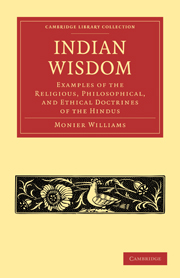Book contents
- Frontmatter
- PREFACE
- THE INDO-ROMANIC ALPHABET WITH THE EQUIVALENT SANSKṚIT LETTERS AND RULES FOR PRONUNCIATION
- Contents
- INTRODUCTION
- LECTURE I The Hymns of the Veda
- LECTURE II The Brāhmana Portion of the Veda
- LECTURE III The Systems of Philosophy
- LECTURE IV The Nyāya System of Philosophy
- LECTURE V The Sānkhya System of Philosophy
- LECTURE VI The Mimāṉsā System of Philosophy
- LECTURE VII Irregular Systems and Eclectic School
- LECTURE VIII Smṛiti. The Vedāngas
- LECTURE IX Smārta-sūtra. Gṛihya, ‘domestic rules’
- LECTURE X The Law-books. Mainu continued
- LECTURE XI Metrical Version of some of Manu's Moral and Religious Precepts
- LECTURE XII The Epic Poems
- LECTURE XIII The Mahā-bhārata
- LECTURE XIV The Epic Poems compared together and with Homer
- LECTURE XV The Artificial Poems
- INDEX
- ADDITIONS AND CORRECTIONS
- ORIENTAL WORKS
LECTURE XI - Metrical Version of some of Manu's Moral and Religious Precepts
Published online by Cambridge University Press: 29 August 2010
- Frontmatter
- PREFACE
- THE INDO-ROMANIC ALPHABET WITH THE EQUIVALENT SANSKṚIT LETTERS AND RULES FOR PRONUNCIATION
- Contents
- INTRODUCTION
- LECTURE I The Hymns of the Veda
- LECTURE II The Brāhmana Portion of the Veda
- LECTURE III The Systems of Philosophy
- LECTURE IV The Nyāya System of Philosophy
- LECTURE V The Sānkhya System of Philosophy
- LECTURE VI The Mimāṉsā System of Philosophy
- LECTURE VII Irregular Systems and Eclectic School
- LECTURE VIII Smṛiti. The Vedāngas
- LECTURE IX Smārta-sūtra. Gṛihya, ‘domestic rules’
- LECTURE X The Law-books. Mainu continued
- LECTURE XI Metrical Version of some of Manu's Moral and Religious Precepts
- LECTURE XII The Epic Poems
- LECTURE XIII The Mahā-bhārata
- LECTURE XIV The Epic Poems compared together and with Homer
- LECTURE XV The Artificial Poems
- INDEX
- ADDITIONS AND CORRECTIONS
- ORIENTAL WORKS
Summary
I NOW endeavour to give, as literally as possible, a metrical version of some of Manu's most noteworthy precepts, selected from different parts of the Code, under the four heads of Āćāra, ‘rules of conduct;’ Vyavahāra, ‘rules of government and judicature;’ Prāyaś-ćitta, ‘penance;’ Karma-phala, ‘rewards and punishments of acts.’
Āćdra, ‘rules of conduct’
A Brāhman from exalted birth is called
A god among the gods, and is a measure
Of truth for all the world, so says the Veda (XI. 84).
Knowledge, descending from her home divine,
Said to a holy Brāhman, I am come
To be thy cherished treasure, trust me not
To scorners, but to careful guardians,
Pure, self-restrained, and pious; so in them
I shall be gifted with resistless power (II. 114, 115).
The man with hoary head is not revered
As aged by the gods, but only he
Who has true knowledge; he, though young, is old (II. 156).
A wooden elephant, an antelope
Of leather, and a Brāhman without knowledge—
These are three things that only bear a name (II. 157).
As with laborious toil the husbandman,
Digging with spade beneath the ground, arrives
At springs of living water, so the man
Who searches eagerly for truth will find
The knowledge hidden in his teacher's mind (II. 118).
With pain the mother to her child gives birth,
With pain the father rears him; as he grows
He heaps up cares and troubles for them both;
Incurring thus a debt he ne'er can pay,
Though he should strive through centuries of time (II. 227).
- Type
- Chapter
- Information
- Indian WisdomExamples of the Religious, Philosophical, and Ethical Doctrines of the Hindus, pp. 282 - 308Publisher: Cambridge University PressPrint publication year: 2010First published in: 1875

